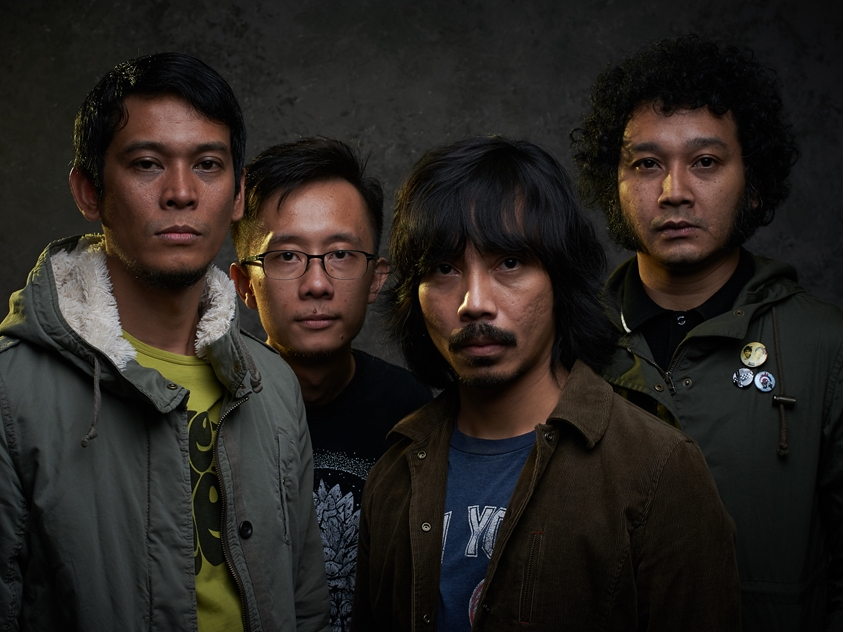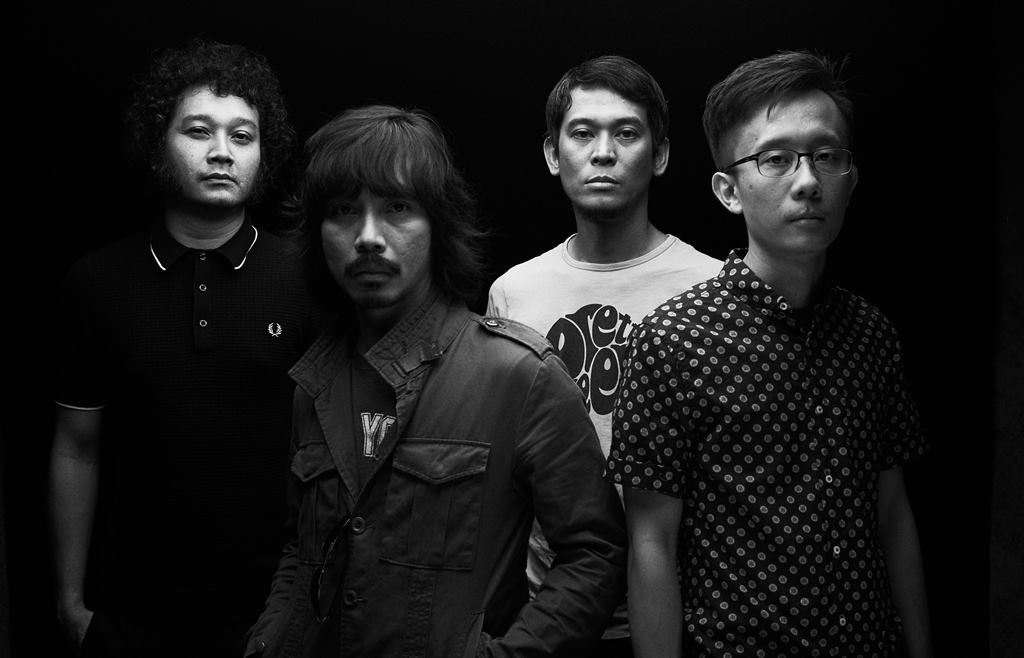Laila’s Lounge: “People tend to call us Radiohead of Malaysia — we’re trying to get away from that now.”
 Thirsty for JUICE content? Quench your cravings on our Instagram, TikTok and WhatsApp
Thirsty for JUICE content? Quench your cravings on our Instagram, TikTok and WhatsApp
Over the course of 20 years, rock band Laila’s Lounge has endured and survived a number of hiatus too high to even count, but they’ve finally reformed last year when they were slated to play at Johor’s Gego Festival. Mere moments before they were scheduled to take the stage, the grim announcement of the passing of Tunku Jalil ultimately cancelled the music event. The band, however, seized the opportunity of assembling all members present by having a meeting that was almost business-like. “It was like an AGM meeting, we even had meeting minutes!” laughs Wandi, who’s on keys.
The band is in the midst of working on their new album with Ridzuan of Seven Collar T-Shirt serving as producer, with intentions of mainstream penetration. The recently released music video for ‘Bebastereo’ featured two faces from the music scene and in spite of the violent brawl, the MV is an open-statement on the current political climate. Seeing that they’re aiming for a more pop approach – they’ve tamed their initial ideas by changing the direction of the video and the song title from the weighted ‘Jerusalem’ to its current innocuous portmanteau.
This time around, Laila’s Lounge’s return is to cement a musical identity entirely their own – not a rojak band or Radiohead of Malaysia, but simply Laila’s Lounge. JUICE speaks with frontman Hadi and Wandi about their process to be more approachable with their music, Hadi’s lyric writing evolution through the years, and steering away from a certain label thrust upon them.
Images Ahmad Cipoi Saiful
Alright, let’s start with the making of the ‘Bebastereo’ music video. There are certainly a lot of messages besides the overt violence. Can you guys explain the idea behind it?
Hadi The project started when we decided Razaisyam to be the director for the music video. So, I just gave him the song. At first, the song was political – [it] involved policemen – we thought it was too much of a statement to make. The original title of ‘Bebastereo’ was ‘Jerusalem’, but we thought it was too strong of a name, so we chose ‘Bebastereo’ because it’s edgy and sounded not so serious. The song is about liberty – personal liberty, freedom of speech.
Wandi The video is a reflection of the indirect messages in the lyrics. It is a gamble but it’s translated into a fight – just like in the video.
H It’s not about the violence (laughs).
W It’s actually about diversion. Every time there’s drama from you-know-who, they create something so you’d forget the first issue. So indirectly, it’s something to gamble about but we translate it into something else so people will be distracted.
“We’re pushing the band forward more than ever before.” – Wandi
With the constant breaking up and coming back together, what was the constant that brought all of you together?
W It’s because of friendship. It’s easier when you’re playing with the ones you’re comfortable with. Under certain circumstances, we reformed the band with the lineup that we have now. And we had discussions and we made it clear that we’re gonna release an album and other releases like music videos and such. We’re pushing the band forward more than ever before.

From the new batch of songs, ‘Bebastereo’, ‘Fatal’, ‘Mana Kurnia’, it’s clear that it doesn’t sound as diverse as the songs on Kosong. Can you talk a bit on the direction of the new songs?
H For the new direction, we want to be wise in our arrangement. The last time, we were quite gung-ho (laughs), maybe it was due to age or the music we were listening to at the time. We wanted the band to adapt to the new sound, but maybe we’ve haven’t developed our own sound yet… we came from different backgrounds and when we started to make music together, we threw everything into the songs – you can hear so many things in our songs.
W Because the whole scene is changing right now, we want to be on par with that as well.
H We want to introduce electronic elements, orchestras as well.
W The songs you listened to – ‘Fatal’ and ‘Mana Kurnia’ – are quite dark but there are soft spots on the album, which I would consider to be quite pop.
H We aim for the songs to be played on radio, so we cleaned the songs up in the mixing process. We turned down the grit of the song, so it appears cleaner and accessible. Hence why we changed the song title (‘Bebastereo’) as well.
“… the band wants to write pop songs but with the flavour of Laila’s Lounge.” – Hadi
Are you happy with that restriction of sorts?
H Generally, as a band, we’re not satisfied with the outcome of the song, because to our ears, it’s too young and clean. But I think it’s necessary for our band because we’re a band with a mission, because we’ve just made our comeback – we want to reach a wider audience, so we have to accept that. In short, the band wants to write pop songs but with the flavour of Laila’s Lounge.
Well, Hadi, we know you’re a poet and a writer, so we wonder how do you reconcile having to appeal to the masses without sacrificing too much of your artistic integrity?
H I think the masses can accept the artistic qualities of a song. It’s just us as the artiste; we have to give them something that is worthy of their acceptance. I don’t write cheesy lyrics – I’ll give them what I want to give them, I’ll give them my lyrics. But I also sweeten the words and choose the words wisely. I didn’t write any obscure lyrics [this time around.]
W Back in the days when ‘Mawar Khayalan’ was a hit, the lyrics are actually quite serious and sarcastic.
Hadi, being the only songwriter in the band, how has your writing changed over the years?
H I’m trying to throw away the clutter in the lyrics. You know, sometimes the Malay language is too cluttered because of the nature of the language – it can be bunga-bunga sangat (laughs). But, I’m trying to be more contemporary. And in the book scene, we have all these indie publishers and writers who write with more accessible language. I’m trying to replicate that in my lyric writing so people can easily relate to it. The lyrics of ‘Mana Kurnia’ is quite direct, it’s actually a narrative; people can interpret the words at their own will. It’s a legend about a man against his ruler.

Is making music now more difficult as compared to when the band was younger?
W Yes, because we have a long distance relationship – there are three of us here and two of us in JB. But Hadi is still actively making music.
H It’s difficult because of our domestic lives – we’re busy with our own family and the works.
W But we adapt to technology by using Dropbox!
How is it working with Ridzuan of Seven Collar T-Shirt – the producer of the new album?
W He’s quite expressive (laughs). He’s quite strict at the same time.
H He’s also quite an experienced producer, especially for pop artistes.
W He knows we’re trying to break into the mainstream, so he channels the whole production into that mass direction, there’s no experimentation.
H He gave more structure to the songs, some that we didn’t even think about. For example when I wrote a new draft, he’d say, “Why not add a chorus after two lines?”
“Music is changing, and we don’t want to be stuck in the past, for example, always listening to OK Computer.” – Hadi
Is there anyone or any album that has inspired the band’s creative direction?
H There’s more democracy now in that the band members and producer can bring their own references and ideas of how a song should sound like, and what we should listen to. Music is changing, and we don’t want to be stuck in the past, for example, always listening to OK Computer.
Both (Laughs).
W Yes, back then, people tend to call us the interpretation of Radiohead in Malaysia – even now. We’re trying to get away from that now.
www.facebook.com/lailasloungeofficial


 Get Audio+
Get Audio+ Hot FM
Hot FM Kool 101
Kool 101 Eight FM
Eight FM Fly FM
Fly FM Molek FM
Molek FM